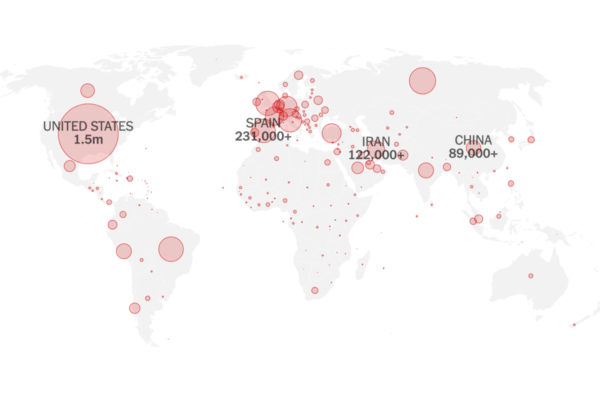First human test of a vaccine: So far, so good
May 19, 2020 · By Patrick J. Lyons for www.nytimes.com

We got an encouraging report on Monday about the first coronavirus vaccine to be tested in people, and not just in the lab. The manufacturer said the vaccine appeared to be safe and able to stimulate an immune response in a Phase 1 trial.
That doesn’t prove it works. It was a small trial — just eight people, all healthy volunteers between 18 and 55 — and the data hasn’t been shared publicly. Still, it would appear to be an important step in the right direction, one the world has been desperate to take.
A company called Moderna is collaborating on the vaccine with the agency led by Dr. Anthony Fauci, the National Institute of Allergy and Infectious Diseases, which has been leading the clinical trials (more are being conducted).
The company said the eight volunteers all produced at least as many virus-neutralizing antibodies as you would see in someone who recovered from Covid-19. That’s the point of a vaccine, to get the body to produce those antibodies without becoming sick. And when they were tested in the lab, Moderna said, the antibodies stopped the virus from replicating — another good sign.
It will take larger, longer studies to determine whether this vaccine can protect people from getting the virus in real-world conditions. It’s not even certain yet that antibodies can do that for this virus, or how long the protection might last.
Moderna’s technology, involving genetic material called mRNA, is relatively new and has yet to produce an approved vaccine for any disease. Even so, the positive signs for this one thrilled Wall Street.
Rivals are close behind: Dozens more companies and universities are also racing to develop coronavirus vaccines, and several have begun testing in human subjects, including Pfizer and its German partner BioNTech; the Chinese company CanSino Biologics; and Oxford University, working with AstraZeneca.
That’s good, experts say, because the world will need multiple vaccines from multiple manufacturers to meet the urgent need for billions of doses. Even so, there is widespread concern that all this haste could compromise safety: It usually takes several years, at least, to test a new vaccine thoroughly for unexpected problems.
The Times is providing free access to much of our coronavirus coverage, and our Coronavirus Briefing newsletter — like all of our newsletters — is free. Please consider supporting our journalism with a subscription.
Medical workers may pay a heavy mental price
Many doctors, nurses and emergency responders working on the front lines of the pandemic are struggling with mental health consequences that are likely to continue and could worsen, experts say, even when the numbers of new Covid-19 cases and deaths begin to wane.
As the adrenaline from facing the first wave of infections wears off, medical workers may be left with the trauma of witnessing so much death and extreme illness. Recent international studies of health care workers who treated virus patients have found soaring rates of anxiety and insomnia, among other issues.
“There is a wave of depression, letdown, true PTSD and a feeling of not caring any more that is coming,” said the chairman of the emergency department in one New Jersey hospital.
The other problems many health care workers face because of the pandemic — spouses who have lost jobs, children who now need home schooling, an end to socializing with colleagues after work — can make decompression nearly impossible. And there is no finish line in sight.
Some medical workers are being offered specialized therapy meant to keep long-term psychological harm from taking root, and to help them keep doing their jobs effectively.






